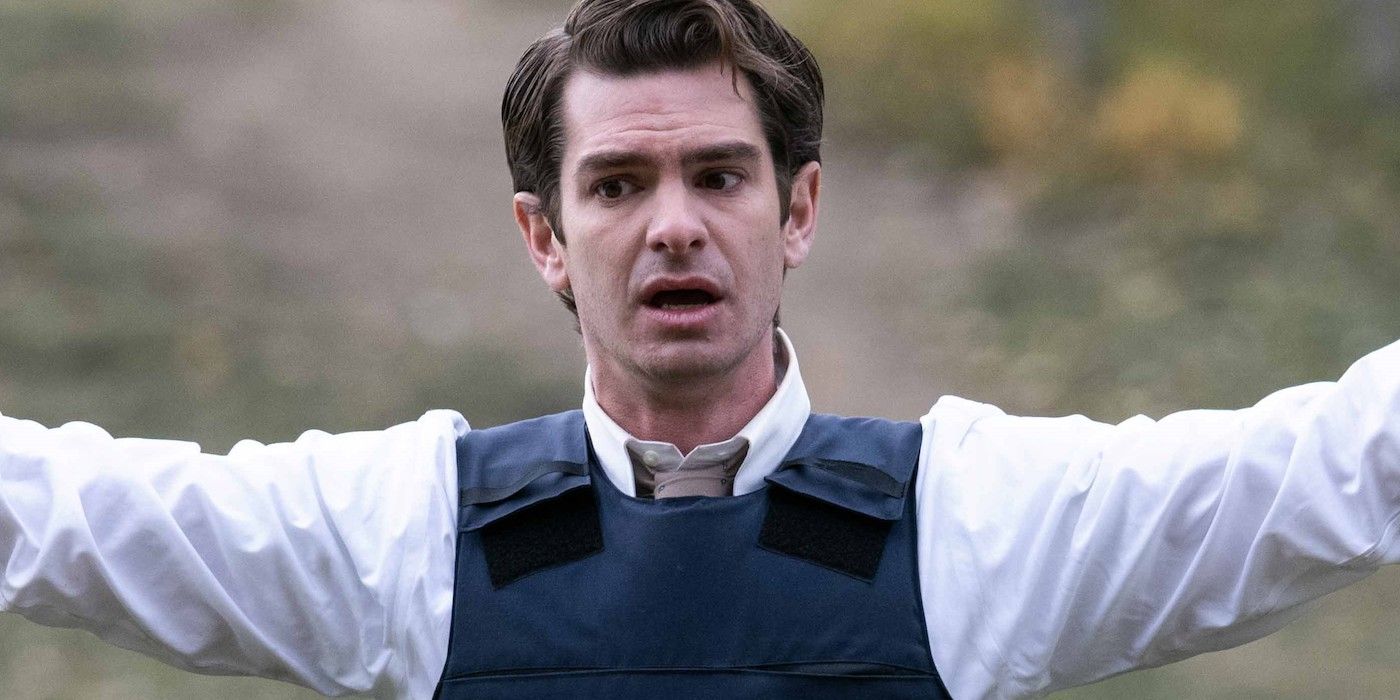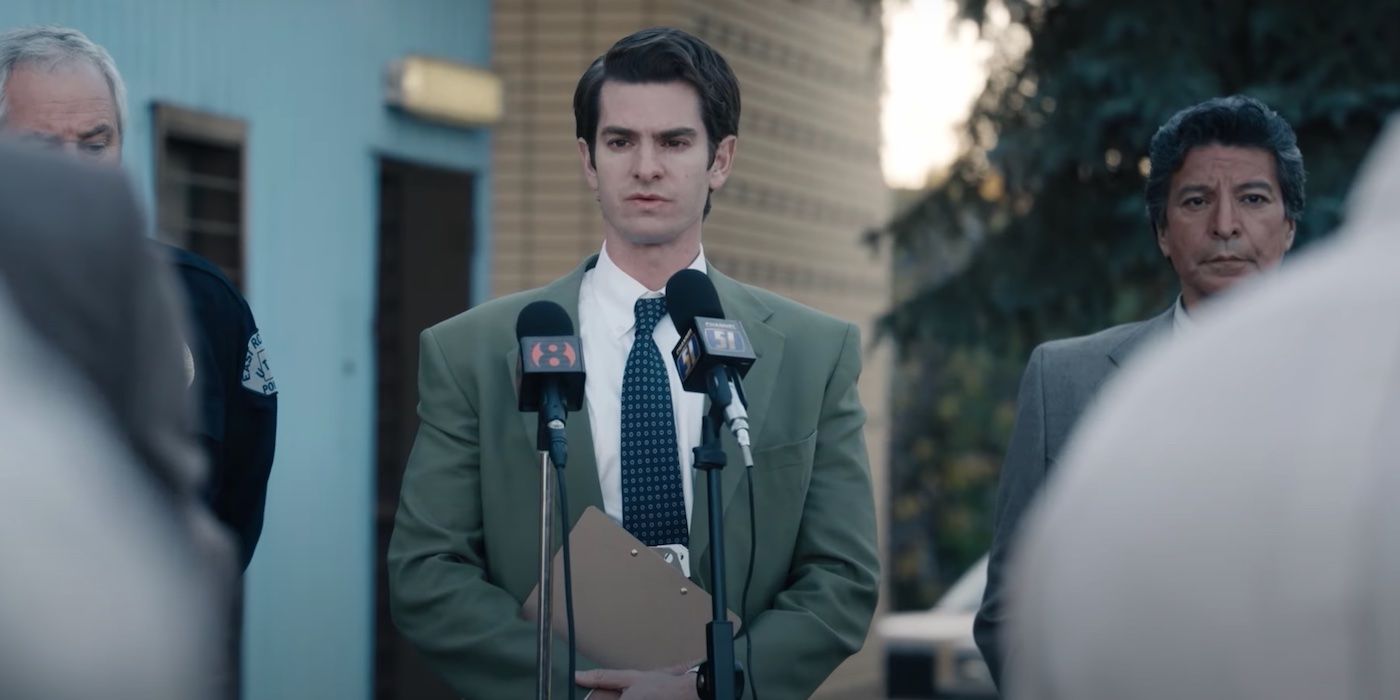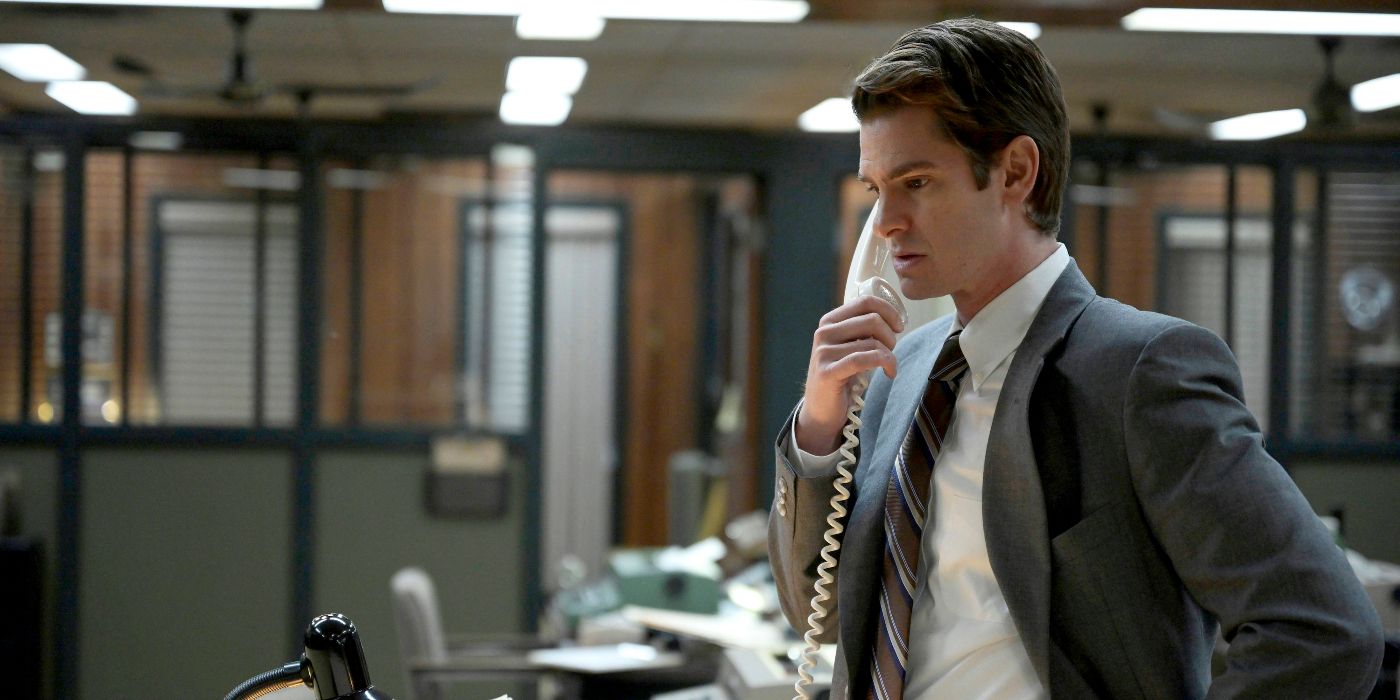The new FX detective series based on a real case, Under the Banner of Heaven, was a show that arrived with a high degree of skepticism surrounding it. Being based on the meticulous and masterfully written nonfiction book of the same name by acclaimed author Jon Krakauer set a very high bar for what this story could be, ensuring that it had its work cut out for it. Not only did said book cover a horrifying crime with detailed dedication, but it also dug into hundreds of years of history which are then put in conversation with the present. How could a miniseries ever capture what Krakauer did in his writing? Well, it can’t and smartly doesn’t try. Instead, it creates a way to tread its own path and stand out from a crowded field of true-crime adaptations.
It does this by introducing the character of Detective Jeb Pyre, a man of Mormon faith who is struggling to reconcile his beliefs with a growing disillusionment. Played by a quietly revelatory Andrew Garfield, the role enables him to be both a guide to the audience with his knowledge of the religion at the core of a violent murder and play a more central part of the story when he becomes wrapped up in the fallout from the crime. It is a cliché to say, but this case is personal as he must maintain positive relationships with his faith community while also making sure to see it through to the truth. In case it wasn’t already clear, Pyre is not a real person and never has been. He was an invention of the writers to ensure we had a focal point to the story that has only deepened the emotional investment in the show when it desperately needed it.
As we see him grapple with the horrors he is discovering that are closely tied to the church he himself is a part of, it makes the impact all that more devastating. In the show’s most recent episode, fittingly titled “Church and State,” we have arrived at the halfway point and are beginning to see the toll it is taking on him. As the agent of the state having to confront the church, Pyre is feeling a growing pressure to stay in the good graces of the Mormon community. We see how he is not handling this all that well when he nearly throws up in his office after a particularly pointed confrontation with another Mormon in the police station. As the character begins to question much of his belief system after seeing how it could lead to something so unimaginably horrifying and brutal, Garfield captures this internal turmoil with an eye toward depicting the psychological upheaval above all else. As he said at the premiere of the series “it just lays out the truth without trying to appease and to please.” It isn’t an easy path to get there, though it is a crucial one to pursue to give the show both a grounding point as well as a deeper emotional reference as it all spirals into chaos.
This is important to emphasize as his character has proven to be the most surprisingly enthralling aspect of the show. Yes, there is the foundation of the historical context that led to the brutal events, but it is Garfield's Pyre who gives this all shape and form. It is one thing to hear about how horrible the crime was and what led to it; it is another thing to see the way the discovery of each new piece of information takes hold of a person’s life, driving them into uncertain territory that they may never recover from. Witnessing how Pyre is beginning to lose faith in the church he has devoted his life to leaves a more lasting impression than it would if a non-believer had been leading the investigation. (Although Gil Birmingham's non-religious and skeptical Bill Taba makes for a perfect partner to Pyre)
When he ends up drawing the connection between the violence that took place and the more extreme elements of his faith in a press conference, we know this is not something that he does lightly. Had he never believed in the religion at all, this would be all too easy of a decision to make. The fact that he has arrived at the point where he truly believes that someone he knew could have done this precisely because of their Mormon faith reveals how much he has truly changed. It serves as a robust development of both his character and the central themes of the story in the same breath. Without the particulars of this character and Garfield’s multifaceted portrayal, such moments wouldn’t have the same crushing weight.
In many ways, the inclusion of a character like this also feels like an olive branch that the show is offering to the Mormon community. This is perhaps futile as Krakauer’s book has been condemned by many in the church leadership and there has been some similar pushback to the series. However, what Garfield’s character manages to do is show that there are many different people within such a large faith and that he is still committed to doing his best to do right when the world has gone so wrong. The fact that Pyre has been getting progressively more distressed over the crisis shows how both he, as well as other believers, are not too far gone to understand that something is wrong here.
It is oddly hopeful amidst the muck to see him slowly realizing that his own moral code may no longer align with certain segments of his faith. This creation of more personal stakes not only alters the story in a way that better suits the medium of television, but also makes for a more reflective viewing experience overall. As we see him go further into the darkness at the core of what is eating at him, this conflict will reach a breaking point where he will have to decide whether he can stay in the religion. Whatever his choice, we are along for the ride into this pit of theological despair.



